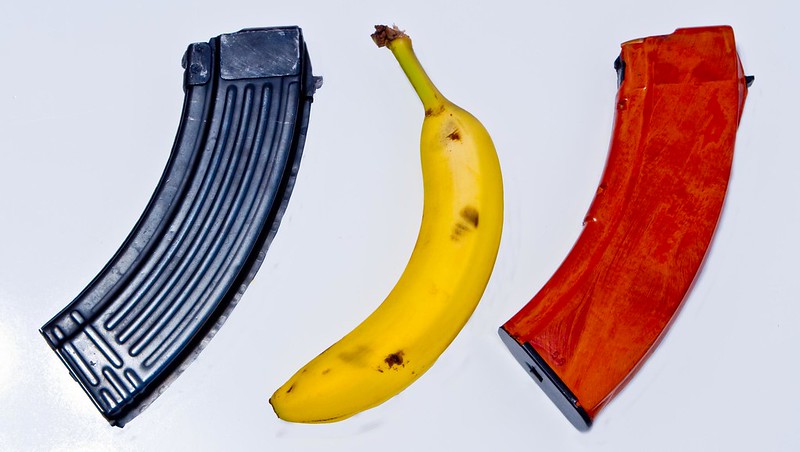Federal Judge Stays California Confiscation of Magazines Holding More than 10 Rounds
This confiscation, even beyond Second Amendment concerns, amounts to an unconstitutional taking of personal property.

Last year California voters passed Proposition 63, a measure that amounted to a mass confiscation of firearm magazines that can hold more than 10 rounds. The new rule was supposed to take effect on July 1, but at the last minute a judge delayed the crackdown while a suit to stop it proceeds.

An earlier law, passed in 2000, banned such products but grandfathered in any magazines that Californians already legally owned. The new law would have prohibited those as well, requiring everyone owning such magazines to get rid of them.
If they still had them after July 1, they'd be guilty of "a misdemeanor punishable by a fine not to exceed one hundred dollars ($100) per large-capacity magazine, by imprisonment in a county jail not to exceed one year, or by both that fine and imprisonment." (Active or former law enforcement officers, as is so often the case, would be exempt from the law.)
Last week, in the case of Duncan v. Becerra, U.S. District Court Judge Roger T. Benitez granted a preliminary injunction on the part of the people and organizations suing to overturn the law. For now, California is legally bound not to enforce the expanded ban, awaiting a final resolution of the lawsuit.
Judge Benitez's reasoning? He starts by pointing out what a mess California's gun laws are in terms of a citizen's ability to understand how they interact to restrict his or her actions:
In California, the State has enacted, over the span of two decades, an incrementally more burdensome web of restrictions on the rights of law-abiding responsible gun owners to buy, borrow, acquire, modify, use, or possess ammunition magazines able to hold more than 10 rounds. The language used, the internally referenced provisions, the interplay among them, and the plethora of other gun regulations, have made the State's magazine laws difficult to understand for all but the most learned experts.
At a hearing before Benitez, the judge notes,
the attorney for the Attorney General, although well prepared, was not able to describe all of the various exceptions to the dispossession and criminalization components of § 32310. Who could blame her? The California matrix of gun control laws is among the harshest in the nation and are filled with criminal law traps for people of common intelligence who desire to obey the law. Statutes must be sufficiently well-defined so that reasonably intelligent citizens can know what conduct is against the law.
Benitez believes that the plaintiffs are likely to win the case on the merits. His decision points out that 9th Circuit (in which this case is being heard) Second Amendment analysis tends to be more complicated than the relevant precedent in 2008's groundbreaking Heller case would indicate.
Heller says that commonly used firearms for home defense use cannot be utterly banned. "Under the simple Heller test," Benitez reasons, this California law is "highly suspect…because they broadly prohibit common pistol and rifle magazines used for lawful purposes….Magazines holding more than 10 rounds are useful for self-defense by law-abiding citizens. And they are common. Lawful in at least 43 states and under federal law, these magazines number in the millions."
Benitez also believes the ban in question does not provide a "reasonable fit" to any articulated goal of the state of California's:
The State's preliminary theoretical and empirical evidence is inconclusive. In fact, it would be reasonable to infer, based on the State's evidence, that a right to possess magazines that hold more than 10 rounds may promote self-defense—especially in the home'and would be ordinarily useful for a citizen's militia use. California must provide more than a rational basis to justify its sweeping ban on mere possession…
The government's evidence that the ban is well suited to a compelling state goal "often seems irrelevant," Benitez adds. It largely consists of random news stories involving guns causing harm; many do not even mention magazine size.
Even the most supposedly thorough empirical data the state brings forward do not, in the judge's read, support the state's belief that there is a reasonable fit between its goals and this magazine ban:
of the 92 mass killings occurring across the 50 states between 2013 and 2009 [in a Mayors Against Illegal Guns study used by the state in this case], only ten occurred in California. Of those ten, the criminalization and dispossession requirements of § 32310 would have had no effect on eight of the shootings, and only marginal good effects had it been in effect at the time of the remaining two shootings….
On this evidence, § 32310 is not a reasonable fit. It hardly fits at all. It appears on this record to be a haphazard solution likely to have no effect on an exceedingly rare problem, while at the same time burdening the constitutional rights of other California law-abiding responsible citizen-owners of gun magazines holding more than 10 rounds.
The state claims the ban is aimed at halting "gun violence," but as Benitez notes,
violent gun use is a constitutionally-protected means for law abiding citizens to protect themselves from criminals. The phrase "gun violence" may not be invoked as a talismanic incantation to justify any exercise of state power. Implicit in the concept of public safety is the right of law-abiding people to use firearms and the magazines that make them work to protect themselves, their families, their homes…[I]t would indeed be ironic if, in the name of public safety and reducing gun violence, statutes were permitted to subvert the public's Second Amendment rights—which may repel criminal gun violence and which ultimately ensure the safety of the Republic.
For those reasons and more, Benitez concludes that California's new magazine confiscation "hits close to the core of the Second Amendment and is more than a slight burden. When the simple test of Heller is applied, a test that persons of common intelligence can understand, the statute is adjudged an unconstitutional abridgment."
Benitez also concludes that this confiscation, even beyond Second Amendment concerns, amounts to an unconstitutional taking of personal property.
David Kopel at the Washington Post has a smart, detailed analysis of the decision's twists and turns.


Show Comments (29)